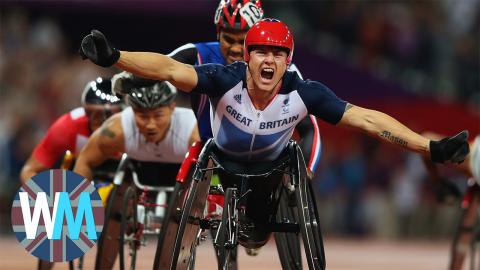Top 5 Ways the Olympics Changed London

It's an event that changed the landscape of London forever. Welcome to WatchMojo UK, and today we'll be counting down our picks for the Top 5 Ways the Olympics Changed London.
For this list, we will be looking at how the 2012 Summer Olympics and Paralympics changed the city of London, and the effects the Games had on social, political and environmental issues in the UK.
Special thanks to our user WordToTheWes for submitting the idea on our interactive suggestion tool: WatchMojo.comsuggest
#5: Gold Post Boxes
As a token of gratitude to Team GB gold medalists at the London Games, the Royal Mail repainted winning athletes’ local post boxes in a sparkly shade of gold, replacing the traditional red. While these commemorative markers are dotted in the hometowns and villages of GB’s winners at dozens of locations throughout Britain, there are plenty on the streets of London. Gold boxes for Mo Farah, David Weir, Anthony Joshua and Charlotte Dujardin all fall within the M25 along with many others, while Andy Murray boasts a special tribute box at Wimbledon. The new look was originally meant as a temporary gesture, but overwhelming public support saw the boxes become permanent, with the Royal Mail installing special plaques as well.
#4: Post Olympics Initiatives
The sports channel network BT Sport clearly benefitted from the 2012 Olympics, as the broadcaster set up shop in the Queen Elizabeth Olympic Park in 2013 and has since become the go-to place for Champions’ League football and a major rival to the long-running Sky network. The Park has proven a fruitful location for other companies too, with Westfield Shopping Centre opening four years prior to the games and establishing itself as one of the largest facilities of its type in Britain. What’s more, a reported post-Games economic boost saw billions of pounds invested into the local area. Games organizers also promised to build more affordable houses once the athletes had left town, but five years after the games those plans had yet to come to fruition.
#3: The Rise of Boris Johnson
As Mayor of London during the Games, having been re-elected earlier that year, Boris Johnson saw his stock rise considerably thanks in large part to the initial success of London 2012. He remained Mayor for four years afterwards, and has since become a major cabinet minister in Parliament. In 2016, his clout as Foreign Secretary helped the Vote Leave campaign win a majority in the EU referendum. However, Johnson wasn’t the only one helped by the Games. Public perception of the Royal Family improved too, with Princes William and Harry appearing as supporters at numerous events. One could also argue that the Queen’s unexpected entrance at the Opening Ceremony was one of the greatest moments of London 2012. Hats off to her Majesty’s PR team.
#2: The Queen Elizabeth Park and The London Stadium
As is the case with every Olympics, the host city undergoes hundreds, if not thousands, of physical transformations. For London, the biggest one was the construction of the Olympic Stadium and its surrounding area, now known as the Queen Elizabeth Park. Since the Closing Ceremony the site has gone through multiple changes, and building work is still ongoing. Plans remain for thousands of apartments, there’s already a university on site, and the stadium itself is now the home of the Premier League’s West Ham United Football Club. City transport also underwent considerable change for the Games, with old infrastructure updated and new train routes added.
#1: The Paralympic Effect
The 2012 Summer Paralympics inspired global audiences unlike any previous Games. Rather than allowing the event to become an Olympics afterthought, organizers used London 2012 as a platform to change opinions and demand attention. Channel 4 bagged the broadcasting deal, and helped spread the word with an award-winning promo campaign. Casting the athletes in a dramatically new light, the stylish ads led with taglines such as “Thanks for the warm-up” and presented competitors as ‘superhumans’. TV ratings and attendance figures were way above average as a result, and the Games is often described as a turning point for Paralympic sport.


